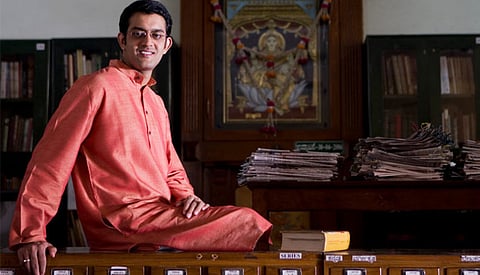

Newly elected Fellow of the Royal Historical Society, Vikram Sampath launched an addition to his duology ‘Savarkar: Echoes from a Forgotten Past 1883-1924’ titled ‘Savarkar- A Contested Legacy 1924-1966’ in a virtual format at the Nehru Centre in London.
Going by the host Amish Tripathi’s saying ‘the worst thing that you can do to your heroes is to forget them’, Vikram’s factual bible uncovers the life of the brave political figure Vinayak Damodar Savarkar whose remarkable contributions contributed to Indian independence.
In the author’s own words: “These are our forefathers who gave their everything so that you and I can be here today and breath free air. The least we can do to show gratitude is by knowing their names and having them as part of every history textbook.”
MORE LIKE THIS…
Substantively Vikram brings back Savarkar’s historic memoirs from the time he spent in London. While reading law at Gray’s Inn, the revolutionary leader’s “seditious activities” to liberate millions of Indians from the bonds of British colonialism gained sympathies from the Irish soldier men in Scotland Yard.
Savarkar’s association to the India House in High Gate is commemorated with an honorary plaque referring to him as an “Indian patriot and philosopher”.
“He was deported from England and dragged to Kala Pani Jail (Andaman and Nicobar Islands) where he was forced to spend twelve horrific years” only to be politically confined in the coastal district of Ratnagiri in Maharashtra upon his release.
“Savarkar resorted to journalism by starting a paper in honour of Swami Shraddhanand.”
Often regarded as the father of the Hindutva ideology, Savarkar propagated the elimination of the ruthless caste system that prevails to this date. “He made Ratnagiri a laboratory for his social experiments on erasing the differences in the society.”
Savarkar openly expressed that “Vedas are universal knowledge, not just for the Brahmin community hence it needs to be democratised to ensure everybody gets access to Vedic literature”. One of his six thousand Marathi poems ‘Aamhi sakal hindu bandhu’ rightly echoes his principles of coming together as a caste-less society.
Vikram highlights the philosopher’s staunch belief against untouchability: “A profession is not something you get based on your birth but on your merit.”
The historian’s inclusion of Savarkar’s inter-caste dining café, temple and schools for the entire community in the town are outstanding illustrations of social transformation for a rather rigid India of the 1920s.
MORE LIKE THIS…
Vikram points out the “monochromatic nature” instilled within stories of India’s freedom struggle. His book brings together the conflicting philosophies of the prominent patriots of the motherland and rejoices Savarkar’s unsung sacrifices.
Vikram states that “multiple parallel struggles and revolts got us independence since the 1857 First War of Independence.” A term coined by the ‘Veer’ Savarkar upon intensively researching through the archives in the British Library.
“He cautioned Nehru about China’s moves and the demographic changes taking place in the Northeast”, notes Vikram about the strategic thinker’s letters on the new-born nation’s geopolitics and foreign policy.